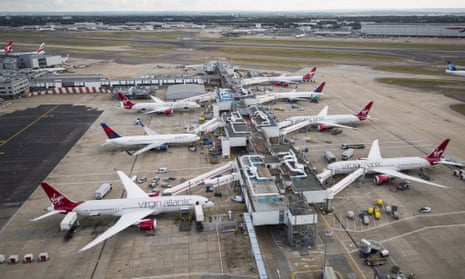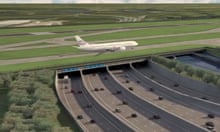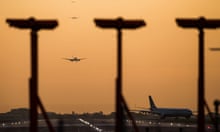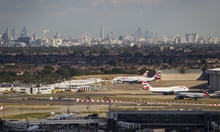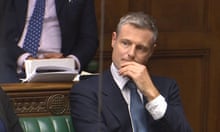The business case
The independent commission charged with deciding whether a new runway should be built in the UK started a report last year by declaring that air links were vital for the economy, trade and investment. It went on to select Heathrow as the best site. After 15 months of deliberation, on Tuesday, the government backed this verdict.
Britain’s biggest airport has long since reached capacity, turning away airlines that would like to operate there. An enormous amount of high-value exports go through Heathrow, which carries more cargo than all other UK airports put together. Businesses have clustered around the airport and the Airports Commission, chaired by Sir Howard Davies, estimated that a third runway would provide up to 77,000 more local jobs.
It would also stimulate economic growth throughout Britain, the commission said. More long-haul routes to emerging markets had been a mantra even before the UK voted for Brexit and a potential separation from its European trading partners. Heathrow has argued that only a hub airport with sufficient connections to other cities makes these routes viable. Almost three-quarters of long-haul flights out of Britain depart from Heathrow. An enlarged Heathrow could provide more connecting flights to the rest of the UK – allowing, for example, Scottish salmon fisheries to swiftly fly their produce around the world.
How true this turns out to be remains to be seen. Regional flights have a poor record at the west London hub, and airlines that pay a premium for Heathrow slots have preferred more lucrative routes than trying to grow new markets. Witness British Airways’ recent decision to ditch Chengdu in favour of New Orleans. But the overwhelming view of business groups, looking at a share of the £211bn in extra economic growth and 180,000 jobs promised by the commission, is that a third runway is long overdue. Gwyn Topham
The environmental cost
Speaking in 2008, Theresa May said: “The third runway at Heathrow would undermine our national [climate change] targets.” The prime minister, having backed a third runway, might have changed her mind, but the move remains a giant leap of faith – without a parachute.
The truth is that sharp cuts in global emissions are urgently required and one-quarter of Britain’s carbon budget will need to be splurged on aviation by 2050, according to the Committee on Climate Change.
Even keeping aviation emissions to this level requires increasingly efficient planes, biofuels and carbon taxes running into the hundreds of pounds per ticket. The committee has asked the government to come up with a strategy to show how these actions can be implemented.
The response has been to pass the buck. “The government believes that action at the global level is the most effective means of tackling aviation emissions,” the government said in October 2015.
But global leaders are also passing the buck. The international aviation deal reached this month does not cut aircraft emissions. Instead, it offsets aviation emissions growth by paying other sectors to curb their emissions and is voluntary until 2027.
If the climate friendliness of the third runway depends on huge, politically unimaginable tax rises on flights by the UK government and an end to international buck passing, what is to be done?
Identifying the real reason for increased flights is key: it is not business, whatever proponents of runway expansion tell you. The proportion of flights taken for work is small and has been flat or falling for a decade, according to government data. Damian Carrington

The political fallout
The wise politician avoids saying never. David Cameron’s “No ifs, no buts, no third runway” quote was catchy and memorable. Three years later, he set up the Airports Commission. It was merely a way of backfilling evidence behind a decision already taken, some observers believed.
Cameron has gone. May, whose anti-third runway Maidenhead constituents will liven up her surgeries over the coming years, will grow tired of being reminded that she condemned Labour’s decision to authorise the third runway in 2009 on environmental grounds.
Approving the third runway now, like Hinkley, is part of May’s determination to invest in infrastructure. But she faces a torrid time from her party. The prime minister has set up some canny and innovative political arrangements to head off cabinet resignations. The decision on Heathrow was taken in a cabinet sub-committee, but the convention of collective responsibility ties all her senior ministers to the move.
In a highly unusual manoeuvre, they are licensed to dissent, but not campaign against the decision. That may be a tough line to police, given the verbal dexterity of her chief opponent, the foreign secretary, Boris Johnson. The education secretary, Justine Greening, already unhappy over the grammar school decision, is another leading opponent and previously threatened to resign over the issue.
Zac Goldsmith, the MP for Richmond Park, could announce that he is standing down in protest. This would trigger a byelection in which he will almost certainly stand as an independent.
Away from Westminster, Conservative councillors are manning the barricades. West and south-west London boroughs including Hillingdon, Richmond and Wandsworth are strongly opposed. So are Labour-controlled neighbours such as Hounslow. The London mayor, Sadiq Khan, could fund a legal challenge.
Theresa May will also have to face down criticism from as many as 60 hostile Tory backbenchers. But even if there is a majority against Heathrow expansion at Westminster, it is unlikely to delay the project. The only vote in the Commons, it seems, would be on the national policy statement for aviation, expected sometime in the next 18 months.
However, protests against the decision are likely to be the most committed and politically challenging since the poll tax in 1990. Anne Perkins
